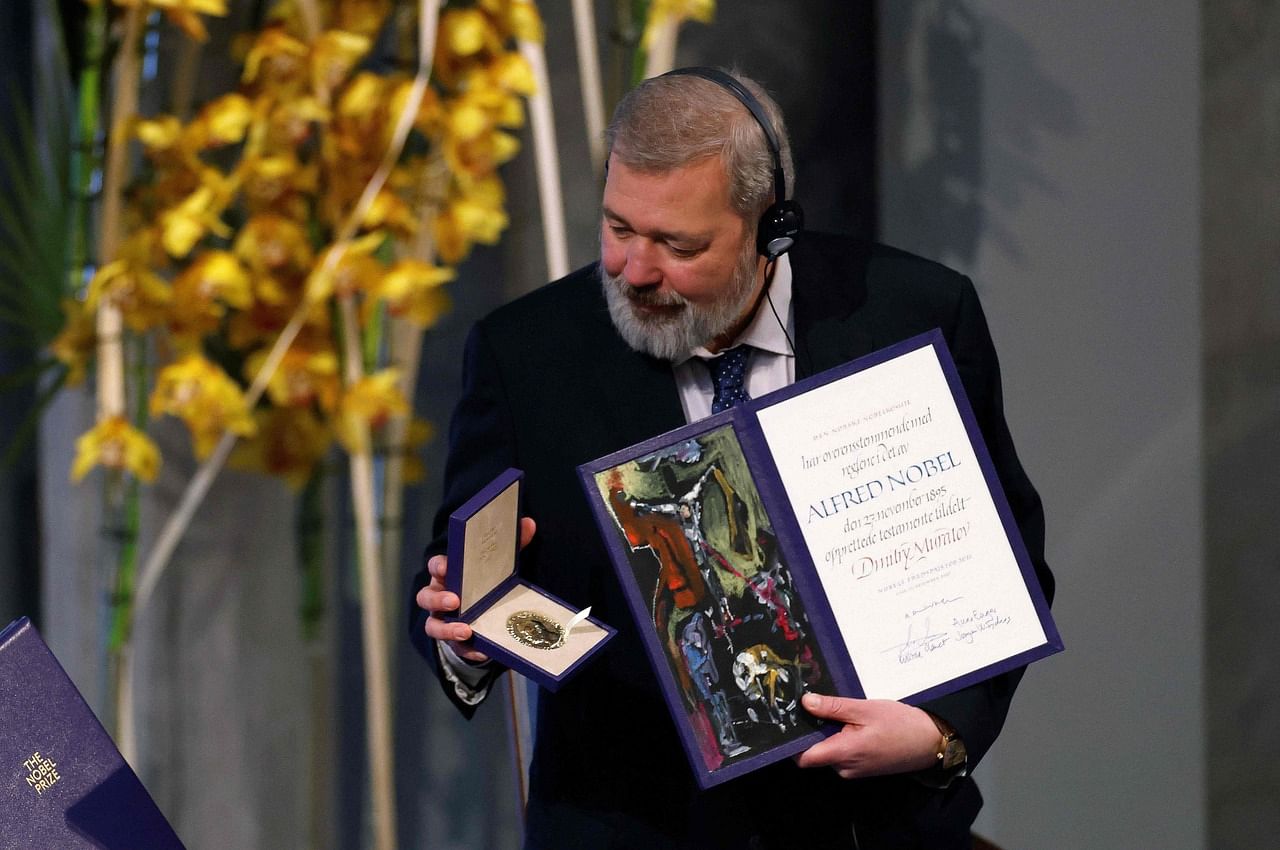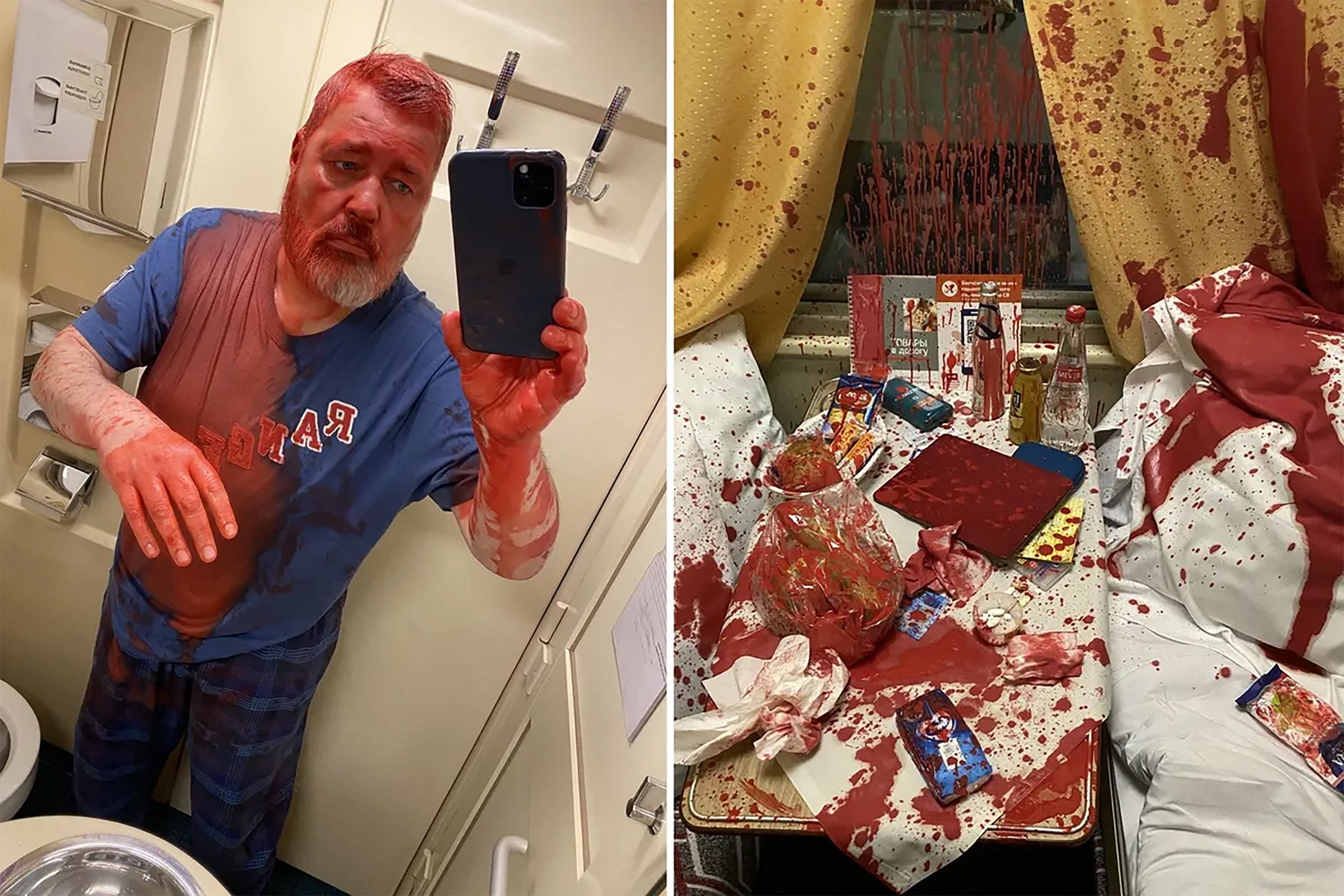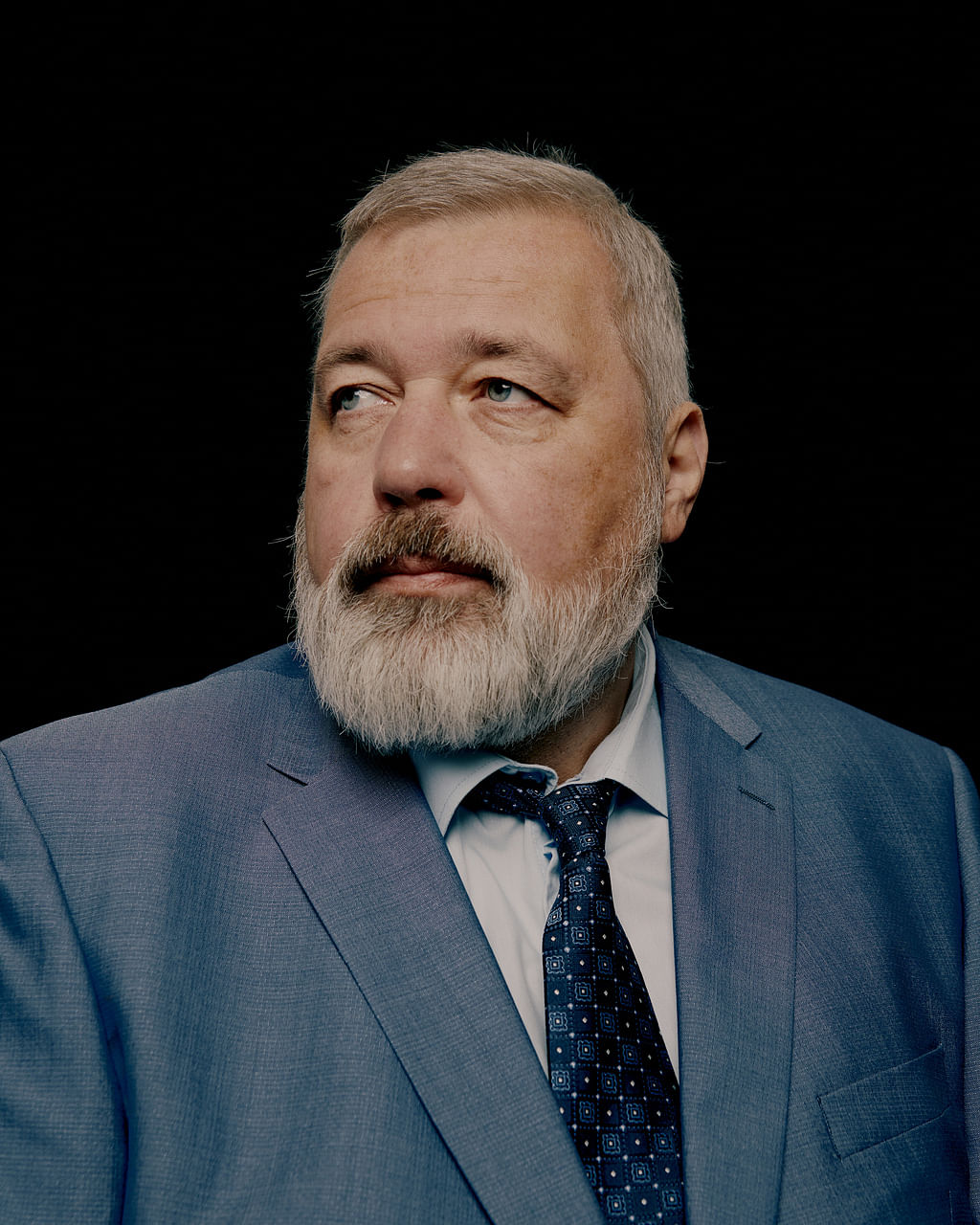MOSCOW (NYTIMES) - After winning the Nobel Peace Prize last October, Russian journalist Dmitri A. Muratov said he thought the honour should have gone to a different Russian: jailed opposition leader Alexei Navalny.
Mr Muratov, editor of the independent newspaper Novaya Gazeta, who shared the prize with journalist Maria Ressa of Rappler, a news outlet in the Philippines, later announced that he would donate his roughly US$500,000 (S$690,000) in prize money to support various charitable causes.
And now Mr Muratov - whose paper suspended publication in late March, saying Russia's increasingly draconian press laws made it impossible to truthfully cover the war in Ukraine - is giving away the 23-karat gold Nobel medal itself.
On June 20, the medal will be sold in New York by Heritage Auctions. All proceeds will go to UNICEF to help children who are refugees from Ukraine.
In an interview last month at the auction house's headquarters in New York, Mr Muratov, speaking in Russian, said the sale was "an act of solidarity" with the 14 million Ukrainians displaced by the Russian invasion, which he called "a tragedy".
"If we look at the number of refugees, we basically have World War III, not a local conflict," he said. "This has been a mistake, and we need to end it."
The auction house, which will be taking no commission, has sold several Nobel medals, including that of Francis Crick, the co-discoverer of DNA, which fetched a record US$2.3 million in 2013.
Mr Josh Benesh, Heritage's chief strategy officer, predicted Muratov's would give it "a run for that."
But Mr Muratov said he was inspired by a different Nobel auction, which saw Danish physicist Niels Bohr sell his medal to help the Finnish war effort following the Soviet invasion of Finland in 1939.
Back then, Mr Muratov said, the Soviets gave a similar justification for their invasion. "They announced that they would attack Finland so that Finland won't attack them," he said.
The Nobel auction is a grand gesture from a man long seen as the dean of Russia's besieged independent press. Novaya Gazeta, founded in 1993 with funding from Mikhail Gorbachev, the last Soviet leader (and himself a Nobel Peace Prize winner), has long been known for its reporting from conflict zones, its investigations and its campaigns on behalf of children with rare diseases or families in hardship.
"They occupy a space between journalism and activism," said Dr Polina Sadovskaya, the Eurasia director for the free-expression group PEN America.
The paper was also known for its ability to remain open and independent, operating, as Russian American journalist Masha Gessen put it last year in The New Yorker, "in a near-constant state of emergency."
Six of Novaya Gazeta's journalists have been murdered since 2000, including Anna Politkovskaya, a critic of Russia's war in Chechnya who was gunned down in the elevator of her Moscow apartment building in 2006. Their portraits hang in the paper's Moscow office, and Mr Muratov has described his Nobel as a tribute to them.

But even as other independent outlets were shut down or co-opted under the government of Vladimir Putin, Novaya Gazeta survived, observers said, thanks in part to Mr Muratov's long-standing connections and willingness (criticised by some factions of the country's fractured opposition) to make some strategic compromises, including holding back on investigations of wealth held by family members and suspected romantic partners of Putin and his inner circle.
"He made a valiant effort to continue operating with the incredible restrictions, and the incredible risk, to try to do independent journalism inside the country," said Ms Ann Cooper, a former Moscow correspondent and former executive director of the Committee to Protect Journalists. "Ultimately, he had to make a terrible decision."
Everything changed after Russia invaded Ukraine on Feb 24, and the Kremlin enacted a harsh new law punishing anyone who spreads "false information" about the invasion with up to 15 years in prison, effectively criminalising independent reporting on the war. Under the law, for example, it could be illegal to call it a "war," rather than a "special military operation".
Novaya Gazeta (a collective, majority-owned by its employees) stayed open for 34 days as most other independent Russian outlets were shuttered, many journalists left the country and many Western news organisations suspended operations. "It was a media holocaust," Mr Muratov said.
And March 28, Novaya Gazeta announced it would suspend operations after receiving two warnings that its coverage had violated the law. To continue, Mr Muratov said, would have put his employees at risk.
"This is wartime censorship," he said in the interview. "Under these circumstances, we can't publish honest material."
Then, on April 7, Mr Muratov was attacked after boarding a train in Moscow, when a man threw what he called a "very smelly" red paint laced with acetone onto his face, burning his eyes. US intelligence agencies have concluded that Russian intelligence operatives orchestrated the attack.

During the interview, Mr Muratov alternated between blunt outrage and amused disbelief. Chuckling, he pointed out a blood-red stain on the chipped corner of his cellphone case, before scrolling through photos of the red-splattered train car and a selfie of his ruined New York Rangers jersey.
He also showed some photographs of the alleged attacker. On April 12, Novaya Gazeta resumed publication briefly to post the photos, as part of an investigation that named the man and linked him to a group that denied it had conducted the attack.
But authorities, Mr Muratov said, "are not doing anything". He wears sunglasses to protect his still-sensitive eyes. Asked if the attack had made him afraid, he spoke directly.
"At the newspaper, we have agreed that we never answer two questions," he said. "How do you protect your employees? And are you afraid?"
About 50 of Novaya Gazeta's 120 journalists have left the country, he said. Some have started a European offshoot, Novaya Gazeta Europa, out of Riga, Latvia. It is run independently, Muratov said.
Others are still in the field, he said, writing for European and other foreign news outlets. Mr Muratov said that he plans to start a YouTube channel in Moscow as some shuttered outlets have done. As for the paper, he hopes to resume publication after the war ends, though he acknowledged it is impossible to predict when.
In the meantime, the Novaya Gazeta archives remain available online, drawing what he said were hundreds of thousands of visitors a month, and contributions continue to come in through its crowdfunding platform.

There is significant division in Russian public opinion, with even the Kremlin reporting that 25 per cent of the population opposes the war, Muratov said. He pulled out his phone again to read an update on another old friend, Yuri Shevchuk, the singer in the 1980s Russian rock band DDT, who last month was charged with insulting the army after making an anti-war speech onstage, during which he said there was a difference between loving your country and, to put it more delicately than Shevchuk did, licking your leader's behind. The charges were later dropped.
Last month, on the YouTube channel Zhivoi Gvozd, a successor to Echo of Moscow, veteran journalist Artemy Troitsky, a leading chronicler of the 1980s dissident Soviet rock scene, suggested that young people in Russia should go underground for 10 years, get a job as a janitor as many did in Soviet times, and write for their friends - or the future.
Asked about this advice, Mr Muratov smiled. "We've been friends for 30 years," he said. "I don't listen to his every advice." But he also assailed the "complete idiots" sitting comfortably in other countries urging Russians to overthrow their government. You cannot send people "out into the path of bulldozers and batons," he said.
As the interview wrapped up, Mr Muratov returned to the subject of the Nobel medal and the auction house selling it, whose name, he said, was "not a coincidence." The invasion "stole the past from the refugees and their parents," he said. "We need to create a new heritage for them."

